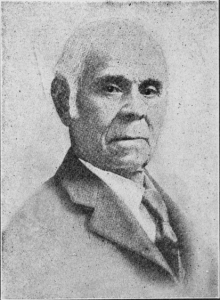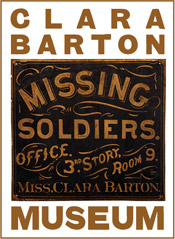”The Day and the War” – James Madison Bell’s Poetry Extolled the Bravery of Black Union Soldiers
Efforts to secure the abolition of slavery took many forms. For African American James Madison Bell (1826-1902) that took the form of writing poetry and lecturing. Bell was a plasterer by trade, but from a young age, worked to cultivate an active life of the mind by attending night school in his hometown of Cincinnati. As he grew older, Bell wrote poetry to advocate for abolition and greater legal and educational rights for African Americans.

James Madison Bell
He was a notable public voice on the lecture circuit in Cincinnati and later Chatham Canada where he moved in 1854. At public presentations, Bell frequently read his poems as speeches to trumpet the plight of African Americans in the United States. His efforts in pushing for abolition brought him into contact with a number of notable nineteenth century characters, including militant abolitionist John Brown who the following poem was dedicated to.
This excerpt from Bell’s “The Day and the War,” was delivered on the anniversary of the Emancipation Proclamation at Platt’s Hall in Cincinnati. Among other things, it described the heroic deeds of some of the first black soldiers to see combat during the Civil War at the Battle of Milliken’s Bend. Fort Wagner, (where Clara Barton treated wounded soldiers and famously depicted in the movie Glory) happened a little over a month later.
The Battle of Milliken’s Bend was fought on June 7, 1863 15 miles northwest of Vicksburg in Louisiana near the Mississippi River as a part of the Vicksburg Campaign. Confederate soldiers hoped to destroy or capture the Union supply base there. The brutal fighting that ensued featured a high percentage of Union African American soldiers. At the battle, the black troops fought bravely in the Union victory and earned the respect of their white comrades. Read below how James Madison Bell chronicled the deeds of the “Black Brigade.”
“The Day and the War”
By James Madison Bell
Though Tennyson, the poet king,
Has sung of Balaklava’s charge,
Until his thund’ring cannons ring
From England’s center to her marge,
The pleasing duty still remains
To sing a people from their chains —
To sing what none have yet assay’d,
The wonders of the Black Brigade.
The war had raged some twenty moons,
Ere they in columns or platoons,
To win them censure or applause,
Were marshal’d in the Union cause —
Prejudged of slavish cowardice,
While many a taunt and foul device
Came weekly forth with Harper’s sheet,
To feed that base, infernal cheat.
But how they would themselves demean,
Has since most gloriously been seen.
‘Twas seen at Milliken’s dread bend!
Where e’en the Furies seemed to lend
To dark Secession all their aid,
To crush the Union Black Brigade.
The war waxed hot, and bullets flew
Like San Francisco’s summer sand,
But they were there to dare and do,
E’en to the last, to save the land.
And when the leaders of their corps
Grew wild with fear, and quit the field,
The dark remembrance of their scars
Before them rose, they could not yield:
And, sounding o’er the battle din,
They heard their standard-bearer cry —
“Rally! and prove that ye are men!
Rally! and let us do or die!
For war, nor death, shall boast a shade
To daunt the Union Black Brigade!”

Sketch of the Battle of Milliken’s Bend from Harper’s Weekly
And thus he played the hero’s part,
Till on the ramparts of the foe
A score of bullets pierced his heart,
He sank within the trench below.
His comrades saw, and fired with rage,
Each sought his man, him to engage
In single combat. Ah! ’twas then
The Black Brigade proved they were men!
For ne’er did Swiss! or Russ! or knight!
Against such fearful odds arrayed,
With more persistent valor fight,
Than did the Union Black Brigade!
As five to one, so stood their foes,
When that defiant shout arose,
And ‘long their closing columns ran,
Commanding each to choose his man!
And ere the sound had died away,
Full many a ranting rebel lay
Gasping piteously for breath —
Struggling with the pangs of death,
From bayonet thrust or shining blade,
Plunged to the hilt by the Black Brigade.
And thus they fought, and won a name —
None brighter on the scroll of Fame;
For out of one full corps of men,
But one remained unwounded, when
The dreadful fray had fully past —
All killed or wounded but the last!
And though they fell, as has been seen,
Each slept his lifeless foes between,
And marked the course and paved the way
To ushering in a better day.
Let Balaklava’s cannons roar,
And Tennyson his hosts parade,
But ne’er was seen and never more
The equals of the Black Brigade!
Along with fighting at Port Hudson (May 27, 1863) and Fort Wagner (July 18, 1863), Milliken’s Bend represented a turning point in the public perception of African American soldiers. Prior to those battles, wide swaths of the Northern public thought black soldiers would be of little use in a fight. Their excellent conduct at Milliken’s Bend won them respect and opened the door for more than 150,000 African American soldiers to enlist in the Union Army with dramatically less public scorn than those who initially enlisted.
About the Author
John Lustrea is a member of the Education Department and the Website Manager at the National Museum of Civil War Medicine. He earned his Master’s degree in Public History from the University of South Carolina. Lustrea has previously worked at Harpers Ferry National Historical Park during the summers of 2013-2016.
Tags: Emancipation Proclamation, Fort Wagner, Glory, James Madison Bell, Milliken's Bend, The Battle of Milliken's Bend, The Day and the War, Vicksburg Posted in: Uncategorized
